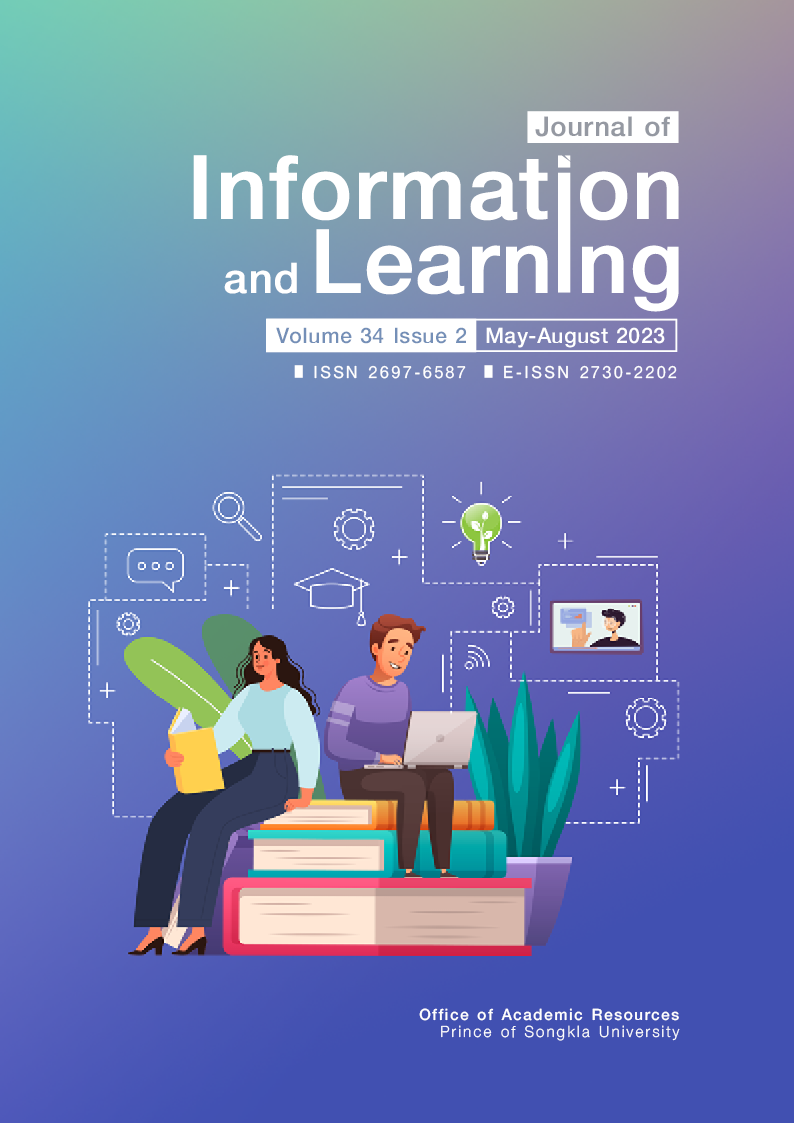The Development of Online Digital Intelligence Quotient Assessment System for Junior High School Students: A Case Study Area of Mueang District in Nakhon Pathom Province
Main Article Content
Abstract
The purposes of this research were to develop an online digital intelligence quotient assessment system for junior high school students in the case study area of Mueang District, Nakhon Pathom, to examine the outcomes of implementing the system, and to study the users’ satisfaction towards the developed system. The research employed research and development design. The sample consisted of 60 students from secondary schools in Mueang District, Nakhon Pathom. The multi-stage random sampling and purposive sampling methods were used. Statistics used to analyze data were percentage, mean, standard deviation and test value. The results showed that the developed system exhibited the highest level of quality. The results of the system usage among students revealed that 73% scored in the low level of knowledge, 25% in the moderate level of knowledge, and 2% in the high level of knowledge. Overall, the satisfaction level of system users was at the highest level. The developed system is a practical tool that can be used to assess an individual's level of knowledge in all 8 skills of digital intelligence.
Article Details

This work is licensed under a Creative Commons Attribution-NonCommercial-NoDerivatives 4.0 International License.
The Journal of Information and Learning is operated by the Office of Academic Resources, Prince of Songkla University. All articles published in the journal are protected by Thailand copyright law. This copyright covers the exclusive rights to share, reproduce and distribute the article, including in electronic forms, reprints, translations, photographic reproductions, or similar. Authors own copyrights in the works they have created as well as the Office of Academic Resources. The Journal reserves the right to edit the language of papers accepted for publication for clarity and correctness, as well as to make formal changes to ensure compliance with the journal's guidelines. All authors must take public responsibility for the content of their paper.
References
Atthaharn, T., & Tongkhambanchong, S. (2020). Analysis of change of digital intelligence in high school student. MBU Education Journal: Faculty of Education Mahamakut Buddhist University, 8(1), 137-145. http://ojs.mbu.ac.th/index.php/edj/article/view/811/654
Chaimeerang, P. (2021). Development of information system for managing learning outcomes of higher education curriculum. NEU Academic and Research Journal, 11(2), 68-82. https://so04.tci-thaijo.org/index.php/neuarj/article/view/248292/172321
Dhananjayamedhi (Sookararattanawong), P. (2018). The development of online test system of Mahachulalongkornrajavidyalaya University [Unpublished doctoral dissertation] Mahachulalongkornrajavidyalaya University.
Digital Economy Promotion Agency. (2017). Dī pā phœ̄i phon samrūat phrưttikam ʻō̜ nalai dek Thai sīang phai khukkhām sī bǣp [Depa reveals online behavior survey results Thai children are vulnerable to 4 types of threats]. GotoKnow. https://www.depa.or.th/en/article-view/4
Electronic Transactions Development Agency Ministry of Digital Economy and Society. (2020). Rāingān phon kānsamrūat phrưttikam phūchai ʻin thēnet nai prathēt Thai pī sō̜ngphanhārō̜ihoksipsām [Thailand inter-net user behavior 2020]. GotoKnow. https://www.etda.or.th/getattachment/c5835c06-e238-4cda-9816-814df31caca5/IUB_2020_Web.pdf.aspx
El-Dahshan, G. (2019). The development of digital intelligence DQ our children one of the requirements of life in the digital age. International Journal of research in Educational Sciences, 2(4), 49-88. https://www.researchgate.net/publication/335831821_The_development_of_digital_intelligence_DQ_our_children_one_of_the_requirements_of_life_in_the_digital_age
Iamsiriwong, O. (2012). Kān wikhro̜ læ ʻō̜k bǣp rabop [System analysis and design]. SE-ED ucation.
Internet Foundation for the Development of Thailand, (2020). Kānsamrūat sathānakān dek Thai kap phai ʻō̜ nalai pračham pī sō̜ngphan hārō̜ihoksipsām [The Situation Survey of Thai Children and Online Threats in 2020]. Xl imaging company limited.
Inthanon, S. (2020). Khwām chalāt thāng dičhithan [DQ Digital intelligence]. Child Media.
Jaroensa, T., & Sengsri, S. (2020). Digital intelligence quotient and creativity and innovation skills in 21st century. Journal for Research and Innovation Institute of Vocational Education Bangkok, 3(2), 21-29. https://so06.tcithaijo.org/index.php/ivebjournal/article/view/245251/166618
Khumsamart, S., Kuljittree, S., & Juntapala, K. (2020). The guidelines for educational administration in the digital distribution era. Journal of Modern Learning Development, 5(3), 245-259. https://so06.tci-thaijo.org/index.php/jomld/article/view/242194/165104
Maneelert, C., & Rattanachuchok, P. (2020). The development of geographic information system showing water quality monitoring results in the area of Muang Kaen Pattana Municipality, Mae Taeng District, Chiang Mai Province. Sripatum Chonburi Journal, 17(1), 104-113. https://www.chonburi.spu.ac.th/journal/booksearch/upload/1958-Chulawalee%201.pdf
Nakhonpathom Provincial Education Office, (2021). Khō̜mūn sārasonthēt dān kānsưksā [Information of Ed-ucation]. GotoKnow. https://drive.google.com/file/d/1Qx5qaM6e9n2eh11ieJIW-wIi-oKYgjnf/view
Newscurveonline, (2020, July 7). AIS push “DQ” digital intelligence, new skills for Thai children in the new normal era. GotoKnow. https://newscurveonline.com/?p=6579
Pakdeewattanakul, K., (2008). Systems analysis and design. KTP COMP & CONSULT.
Rattanasuporn, J., & Kan-Ngan, Y. (2017). The information system development for assessment of elemen-tary level school: A case study of the demonstration school of Nakhon Ratchaima Rajabhat University. Srinakharinwirot Academic Journal of Education, 18(1), 26-41. https://ejournals.swu.ac.th/index.php/jedu/article/view/9155/7883
Silanoi, L. (2019). The use of rating scale in quantitative research on social sciences, humanities, hotel and tourism study. Journal of Management Science, Ubon Ratchathani University, 8(15), 112-126. https://so03.tci-thaijo.org/index.php/jms_ubu/article/view/196862
Srisaard, B. (2003). Kānwičhai bư̄angton [Research for instructor]. M.P.T
Subupakarn, S., (2019, October 17). Management information system. SciMath. https://www.scimath.org/article-technology/item/10477-mis
Thansettakij, (2018, February 7). Dī pā dan wat thaksa khwām chalāt thāngō̜di čhi than dek Thai thīapthao māttrathān sākon [depa pushes to measure Thai children's digital intelligence skills to meet international standards]. GotoKnow. https://www.thansettakij.com/business/257008
Thienthong, M. (2012). Withī wičhai nai khō̜mphiutœ̄ sưksā [Research methodology in computer studies]. DANEX.
Wisniewska-Paz, B. (2018). Emotional intelligence vs. digital intelligence in the face of virtual reality. New Challenges for Education for Safety:The Need for “New” Communication and Adaptation Competencies. Culture e Studi del Sociale, 3(2), 167-176. http://www.cussoc.it/index.php/journal/issue/archive


